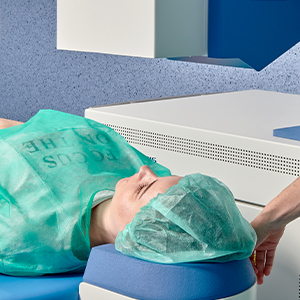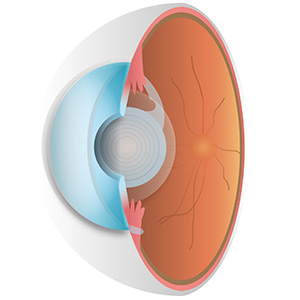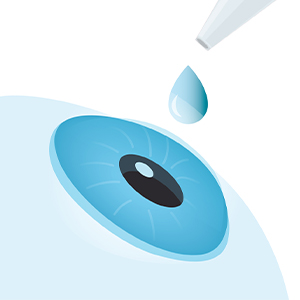Four steps to a glasses-free life
In a lens operation, either the natural, mostly decrepit lens is replaced with an artificial lens (mono- or multifocal lens treatment/MIOL), or an artificial lens is used in addition to the eye’s own lens (ICL treatment).
Both types of treatment aim to get rid of glasses and contact lenses. Which correction method is best for you depends primarily on the type of your ametropia.
Step 1: Non-binding information session
We would be happy to inform you without obligation about the possibilities of lens implantation. You have the choice between a free online video consultation from the comfort of your own home or an informational meeting with an aptitude test at one of our locations.
Who is suitable for this appointment?
This appointment is suitable for all those who are interested and want to get an overview of the possibilities and the treatment process of a lens implantation.

Non-binding information meeting + on-site aptitude test
We would be happy to welcome you to a personal and non-binding information meeting at one of our locations.
As part of an initial aptitude test, our opticians or master opticians examine whether your eyes are suitable for lens implantation.

We carry out the following investigations:
- Measuring the strength of the glasses using a lens meter
- Objective refraction
- Pachymetry (measuring the thickness of the cornea)
- Topography (measurement of the corneal surface)
- Determination of visual acuity
- Measurement of intraocular pressure
After examining your eyes, we will provide you with detailed information and answer all your questions about lens implantation.
Tip: Save time by combining both steps
Combine the aptitude test directly with the preliminary medical examination (step 2) during an on-site visit. You will receive comprehensive examination results of your eyes and our doctors will inform you about the most suitable treatment method for correction.

Step 3: On the day of lens implantation
The lens surgery only takes about 10 minutes per eye. With the preparation time and a short rest after the surgery, we ask you to plan about two to two and a half hours for your stay with us. After your surgery, you stay in our relaxation rooms until your eyesight has returned and your circulation has recovered. The treating doctor decides on the day of the surgery whether your eye will be covered with a protective bandage after the eye surgery. After a short check you can go home. Please let us accompany you or pick you up. You will not be allowed to drive.

Our tips for you:
- Stop eating solid food 6 hours before the lens surgery and only drink a little water at least 2 hours before the surgery.
- Don’t smoke or drink alcohol.
- Do not wear make-up on this day.
- Comfortable clothing is recommended.
- Bring someone with you who can accompany you home after the surgery.
Step 4: The aftercare & behavior after the lens surgery
Please rest at home and please take the eye drops according to plan as discussed. Another medical check-up takes place the next day.
The vision of your treated eye will usually be restored to the greatest possible extent. Please continue to take your eye drops regularly. In the weeks that follow, your vision will continue to improve.
We will see you for a follow-up check after one day, one week, one month and three months. For an optimal healing process, we ask you to follow the recommendations of our medical team. This includes the drop plan and important tips for sports and leisure time in the first few weeks after your lens implantation.

Our tips for you:
- Don’t rub your eyes. A pair of sunglasses during the day and a sleeping mask at night can help here.
- Attend the follow-up checks.
- Rest yourself in the first 24 hours after the surgery and avoid strenuous activities.
- Follow the instructions of your doctor treating you.
- Do not drive again until the doctor treating you gives you the go-ahead.
